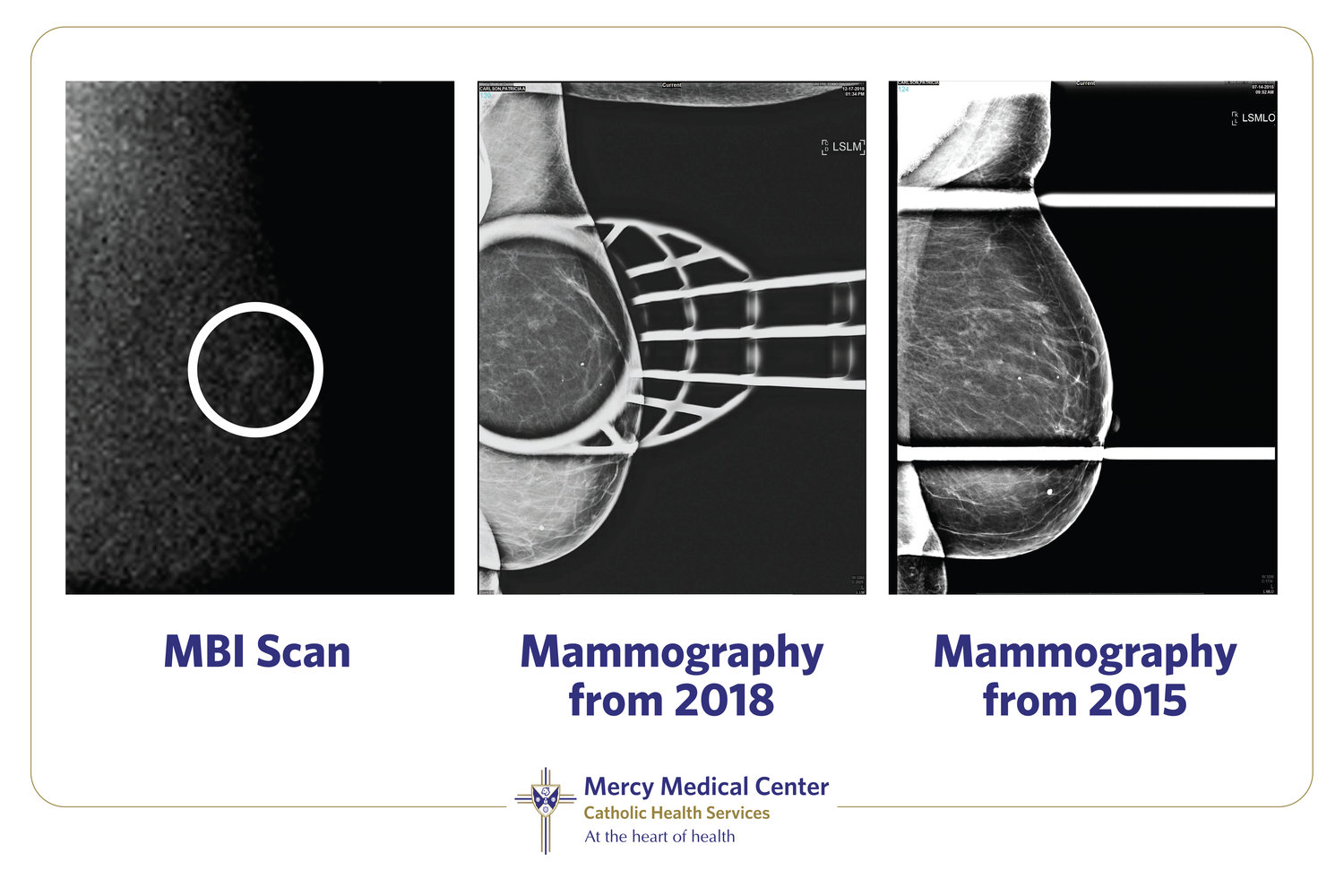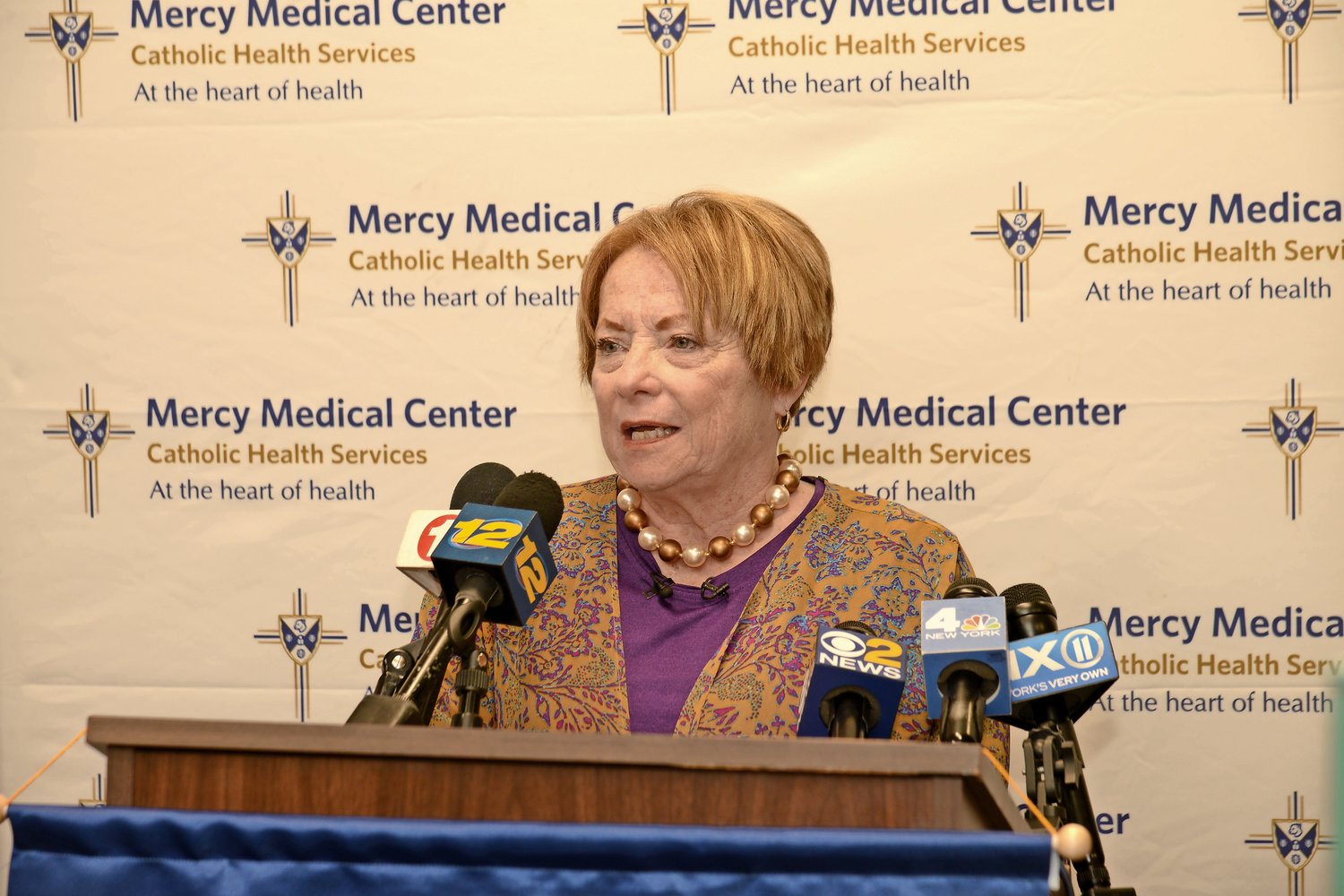Mercy Medical Center detects 'hard-to-find' breast cancer
Mercy Medical Center honored a grateful patient and her family at its Radiology and Imaging Center on May 8.
Patricia Carlson, 73, of Patchogue, visited the Rockville Centre hospital last week, not for a check-up, but for an early Mother’s Day celebration with her two daughters and sons-in-law, grandchildren and husband of 51 years. She anticipated an extra-special Mother’s Day after Mercy’s doctors, using LumaGem Molecular Breast Imaging, or MBI, found and removed breast cancer that was undetectable for years.
Carlson was joined by Peter Scaminaci, president of Mercy Medical Center, Dr. Conellia Ha, director of radiology at Mercy and Dr. Jana Deitch, medical director of breast health at St. Catherine of Siena Medical Center, a fellow member hospital of Catholic Health Services.
“I would like to thank Dr. Ha, Dr. Deitch, this hospital, Mercy, and St. Catherine for all the gifts they have given me,” Carlson said during a news conference, which preceded a luncheon at Mercy. “I’m very grateful.”
Last year, Carlson’s dermatologist found a lump on her neck during a routine skin cancer check. Scans from her oncologist showed that lymph nodes in that area were suspicious for malignancy, most likely breast cancer, doctors said. She was referred to Dr. Deitch at St. Catherine of Siena in Smithtown.
Dr. Deitch biopsied the lymph nodes and found cancer, but could not find the primary site; Carlson’s breast imaging did not show anything suspicious. Since Carlson has a pacemaker, she could not have an MRI. Instead, Dr. Deitch contacted Dr. Ha at Mercy and requested an MBI scan.
An MBI finds more than 400 percent more invasive cancers than a digital mammography alone, hospital officials said. Mercy is the only hospital in New York to offer this technology, they noted.
“We are very proud of that,” Scaminaci said. “It really is amazing, state-of-the-art technology.”
The MBI detected the site of Carlson’s cancer, and doctors then performed a biopsy, which revealed that she had Stage 2 cancer in her left breast.
“I was appalled, because I had been going and doing due diligence,” Carlson said. “I said in my head, ‘Excuse me, why didn’t someone tell me for all these years of going in and getting imaging?’ I thought I was doing the right thing.”
Carlson returned to Dr. Deitch for a partial mastectomy, or removal, of her left breast and axillary lymph node dissection. She is now cancer-free.
Mercy’s MBI technology, Dr. Ha explained, detects breast cancer more precisely than a traditional mammography or MRI. While other technologies may give off “false positives,” MBIs zero in on the spot of the affected location. In this case, it saved Carlson from having a full mastectomy, a much longer and invasive procedure than the partial surgery she received.
“A mastectomy is a very extensive surgery,” Dr. Deitch said. “With someone like Pat, we would have opted to do a partial mastectomy. We did not have that option with the initial imaging, but with the MBI scan, we were able to do a much smaller operation.”
The hospital staff and Carlson’s family presented her with flowers and gift baskets for Mother’s Day before doctors gave tours of the MBI rooms. The Carlsons also enjoyed a pre-Mother’s Day lunch.
“I’m healthy, I’m happy, my family is overjoyed,” Carlson said. “It’s a wonderful thing, and hopefully other men and women can have this technology to find cancers in their bodies. That’s the best gift.”

 50.0°,
Overcast
50.0°,
Overcast 







